how to perform the
cooper running fitness test
for marathoners
The Cooper Running Fitness Test is one of the gold standards of testing a runner's fitness level.
There are two common versions of this test:
- A 12 Minute Run where the goal is to cover as much ground as possible within 12 minutes
- A 1.5 Mile where the goal is to run 1.5 miles in as little time as possible.
Both of these versions test your running fitness level by estimating your Vo2max.
Through these fitness tests, a runner’s Vo2 max is calculated and then their fitness level is accurately assessed.
What is Vo2 max?
Vo2max is simply the maximum volume of oxygen that a runner can take in at any given point of time.
In general, the higher your Vo2max is, the better your aerobic fitness level is. The higher your VO2max is, the more oxygen you will take in and the more energy you will have available in order to keep running.
Your Vo2max is the widely accepted criterion of measurement of your running fitness level, or aerobic capacity.
Note that your Vo2max is related to your aerobic fitness level and not your anaerobic fitness level.
Why Find Your Running Fitness Level?
As a runner we should focus on what we can change and then train to increase our potential in that direction.
That is why I always like to start and end each new training period (for example, beginning a new marathon or half marathon training schedule) with a fitness test.
A fitness test allows you to see what progress you have made.
Granted you will not always be able to increase your fitness level.
Genetics will play a role in shackling you to a certain level of potential. Your aim though is probably to reach your full potential or at least that next attainable level.
One of the best fitness tests for a runner is the 1.5 Mile Cooper Running Test that estimates your Vo2max.
How to FInd and Test your Vo2max through a running fitness test?
A true Vo2max test requires very expensive equipment and should be done under a professional such as an exercise physiologist.
Most runners do not have access to a true Vo2max test and therefore physiologists have designed other tests that runners can perform pretty much anywhere in the world that will give them a pretty accurate reading of their Vo2 max.
One such test, and in my opinion the best test for endurance runners, is the 1.5 Mile Cooper Running Fitness Test. It is a very simple test with little room for user error and is appropriate for long distance runners who are used to running at least 2 miles.
NOTE: If you have a smart watch (such as the FitBit or an Apple watch) you can most likely find your Vo2max estimate in your specifications in your account.
If you do find that your Vo2max has already been calculated for you from recent past runs then you may or may not choose to test its accuracy by taking the 1.5 Mile Run Test.
How to Perform the
1.5 Mile Running Fitness Test
Materials you will need:
- A quarter mile track (400 meters around) or an accurately measured 1.5 mile route to perform the test. Make sure you are aware of the exact distance of the track. While the most common track lap distance is 0.25 miles, some track distances do vary.
- A stopwatch/running watch
- A friend is optional but very supportive in pushing you and keeping you motivated. Friends also make good candidates for monitoring the stopwatch and counting your laps.
Goal of the 1.5 Mile Cooper Running Fitness Test:
Run 1.5 miles (2.4km) in the shortest amount of time possible.
This running fitness test asks you to give an all-out effort, to go as hard and as fast as you possibly can.
In this running fitness test it is very important to really push yourself to your limit in order to obtain an accurate measurement of your Vo2max fitness level.
Quick Tip:
Perform a practice run a couple of days before your actual test so that you can get an idea of how fast you can pace yourself, the logistics of the track, and an idea of how you will go about completing this running fitness test.
How to Perform the Cooper Test through
the 1.5 Mile Run:
Here are the steps you will want to take to perform the 1.5 Mile Running Fitness test.
You can also find a printable set of instructions on how to perform the 1.5 Mile Fitness Test inside the Find Your Running Fitness Level Toolbox.
step 1:
Perform a 10 minute light warm up:
Walking followed by light jogging makes an excellent warm up for this test.
step 2:
Once you are warmed up, start your watch and immediately start running. Remember that you are supposed to run the 1.5 miles as fast as possible.
The best tactic for going about this is to pace yourself, in the beginning, at a hard but sustainable pace that you know you could keep up for the duration of the 1.5 miles but no longer.
Do NOT go all out at the start.
Really push and dig deep at the end, the last 1-1 ½ laps, and go as fast as you possibly can. Lift your knees up high and sprint when you are in sight of the finishing mark.
step 3:
Stop the watch immediately upon completion and record your time to the nearest second.
Bring your worksheet download with you so that you can record your time on your Profile Sheet.
Also make a note of it in your running log or your running app tracker if you use one.
step 4:
Perform a 10 minute cool down consisting of walking or slow jogging. Include some stretching as well.
Don't just pass out on the ground. Bring your heart rate back down to normal.
To really get an accurate Vo2max, perform the fitness test 3 times on separate days, then find your average time and plug that number into the calculator.
What is a good time for a
1.5 Mile Run?
Now that you have your 1.5 mile run finishing time, you will want to find your estimated Vo2max score from it.
From there you can measure your score against others of your same gender and age using the 1.5 Mile Test Charts below!
1.5 Mile Run Test Calculator
Since finding your Vo2max can be so valuable to a marathon runner I wanted to make it easily accessible to you!
You can easily find your estimated Vo2max from the 1.5 Mile Run Test Calculator included inside the Find Your Running Fitness Level Toolbox.
What is a good score for the Cooper Test?
How do I find my Vo2max from it?
After you have calculated your Vo2max from the 1.5 Mile Run Test, look at the 1.5 Mile Run Test Charts below to see how you compare to others of the same gender and age.
There are 2 different charts: one for males and one for females.
The 1.5 Mile Test Charts are also broken down by age as that is a factor that weighs heavily on your running fitness assessment.
Vo2max (1.5 Mile Test) Chart for MEN
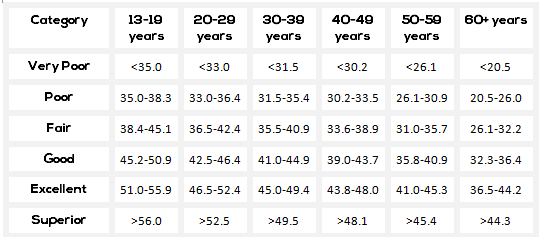
Vo2 max (1.5 MILE TEST ) CHART FOR women
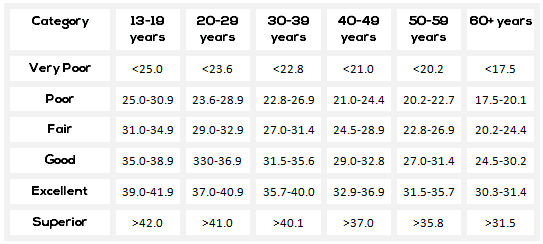
After you find your Vo2max and the classification you fall in, record it on the worksheet inside the Find Your Running Fitness Level Toolbox or in your running log, journal, etc. so that you can track your future improvements!
What is inside the Find Your Running Fitness Level Toolbox:
Here's what's inside the Find Your Running Fitness Level Quick Win Toolbox for Runners:
- A printable download tracker sheet
- Instructions on how to perform the 1.5 Mile Running Fitness test that you can print off or save for a quick review before you take the test
- Things you need to do before you actually take the test
- A Vo2max calculator that will help you estimate your Vo2max based off of your 1.5 Mile Run finishing time
- 1.5 Mile Run Charts for males and females categorized by age so that you can compare yourself to others of the same age and gender as you
Get the Find Your Running Fitness Level Quick Win Toolbox for Runners right here.
Get the Find Your Running Fitness Level Quick Win Toolbox for Runners right here.
Pages related to the COoper running fitness test
👋Sign up to receive the free printable strength exercises for runners: 👇
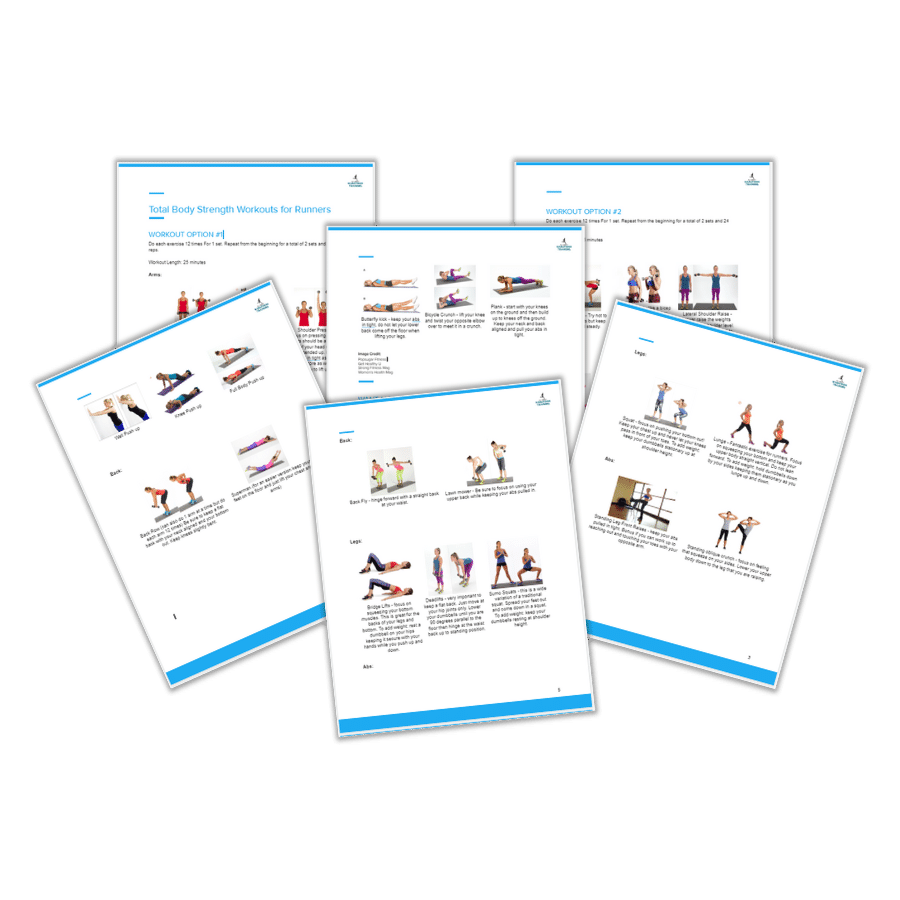 |
As featured on:


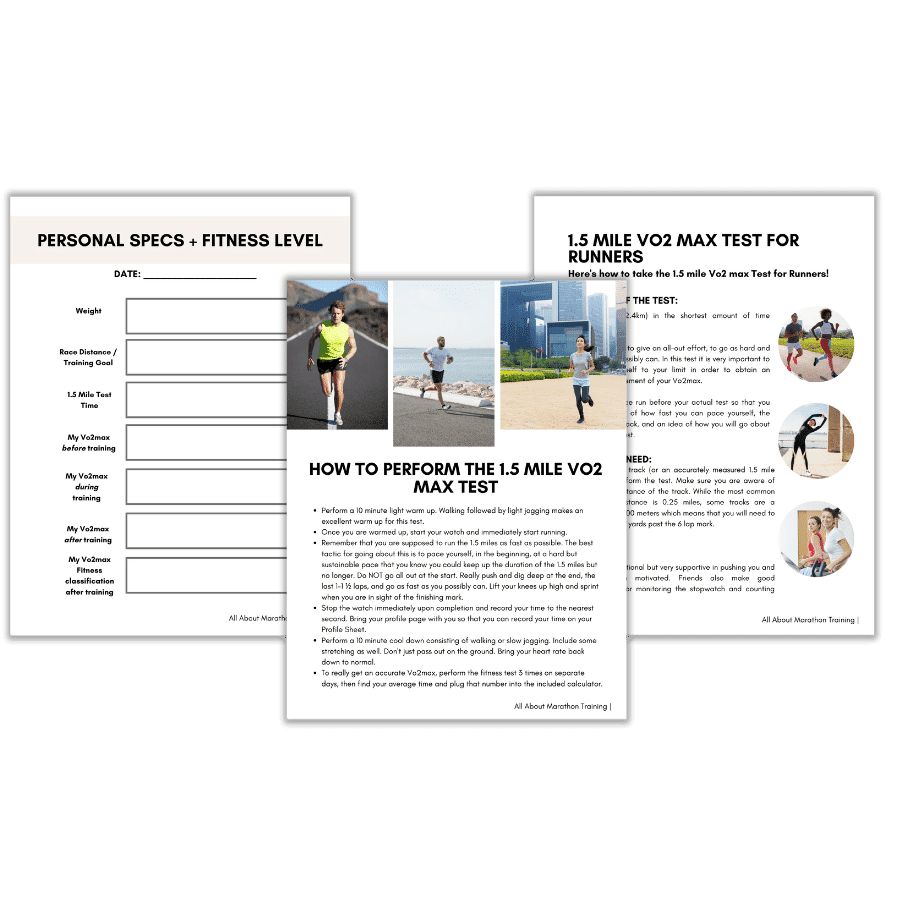

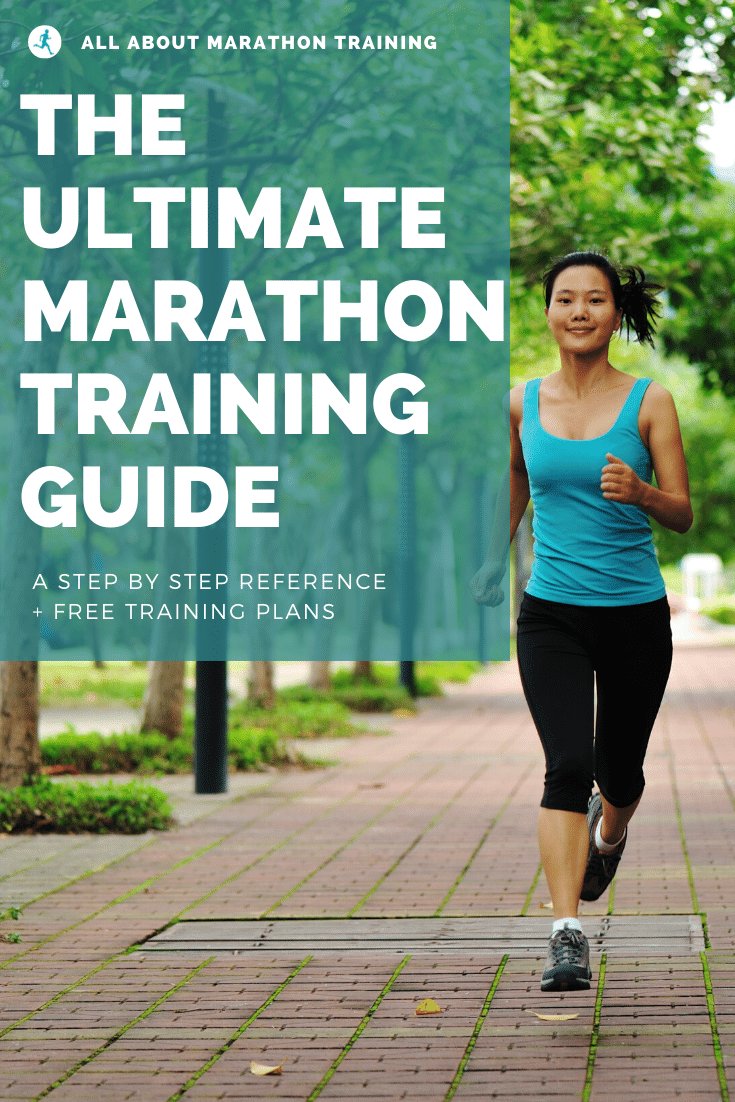
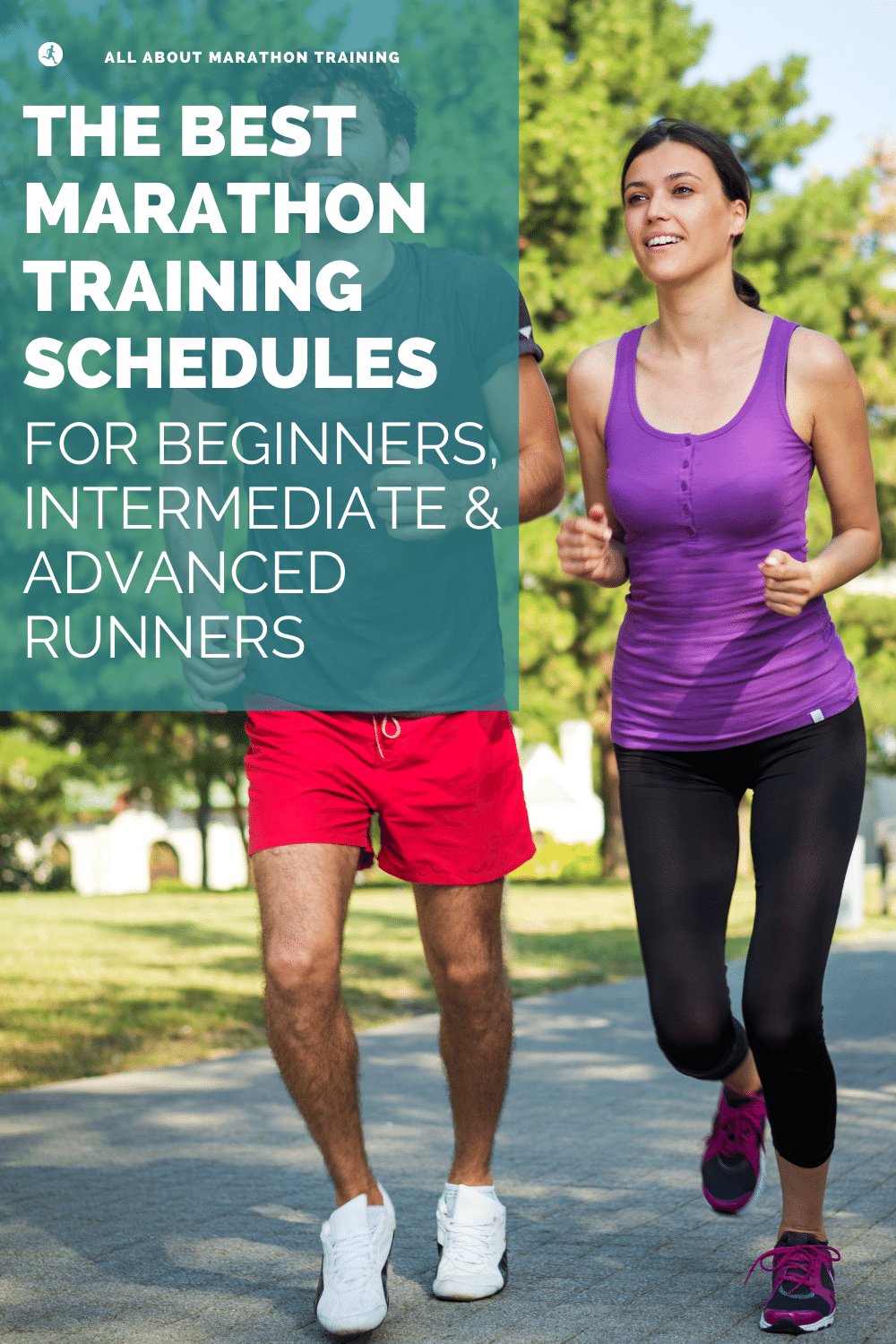
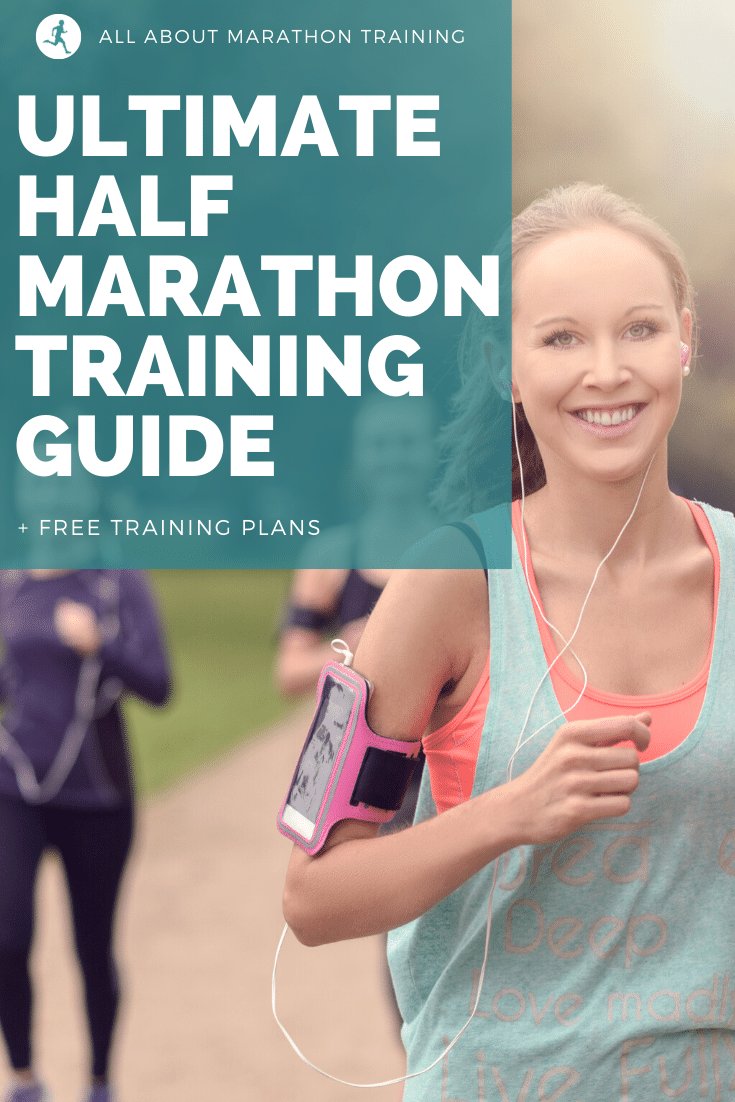


New! Comments
Have your say about what you just read! Leave me a comment in the box below.